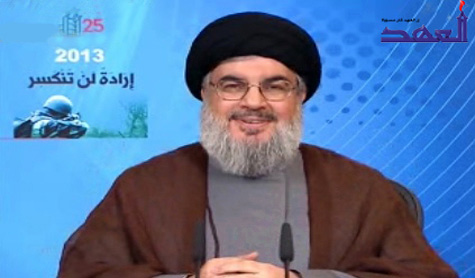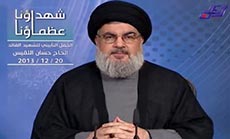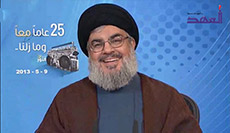Sayyed Nasrallah: “Israeli” Elections Tell Zionist Entity Suffers Crisis Regional Conflicts Political, Not Sectarian
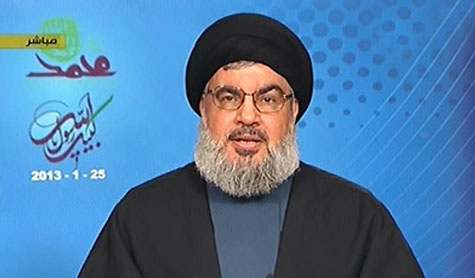
Here is the speech Hizbullah Secretary General His Eminence Sayyed Hassan Nasrallah delivered while celebrating Prophet's blessed birth at "Sayyed Shuhada' Complex" in Rweiss, Beirut on Friday evening, January 25th, 2013:
In the Name of the Most Merciful, the Most Compassionate,
Praises be to Allah, the Lord of the Worlds,
Peace and prayers be upon our master and prophet Muhammad; his chaste, benevolent Household; on his chosen, upright companions, and on all prophets and heralds,
Brothers and sisters, Allah's peace, mercy, and blessings be upon all of you,
As we celebrate our prophet's blessed, glorious, dear, and sweet birth, I very warmly welcome you. And I offer my congratulations to you and to Muslims all around the world on the birthday of Allah's Greatest Messenger, the Master of All Messengers and Creatures, and the Utmost of Prophets, Muhammad Bin Abdullah (Peace and prayers be upon him and his Household).
I, as well, offer my congratulations to you for these days, which Imam Khomeini (May Allah sanctify his secret) announced as the "Islamic Unity Week" - a week that would bring Muslims close together and make them work for the sake of Allah, the Exalted in Might and perfection, as they follow the lead of Allah's Messenger (Peace and prayers be upon him and his Household). I further congratulate you for the birth of our prophet's great and honorable descendent, Imam Jaafar Bin Muhammad as-Saadik (Pbuh).
In my speech, I'm going to talk about this occasion before I address the current incidents generally, the "Israeli" elections briefly, and the Lebanese incidents particularly.
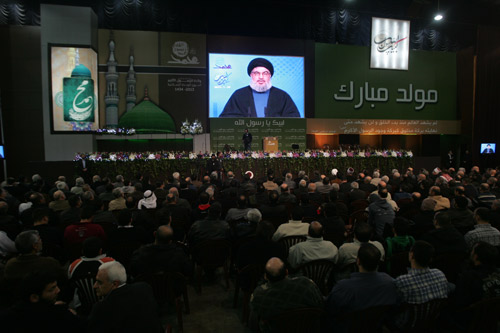
Whenever we want to judge anyone or assess how positive or negative he/she is, we must depend on certain criteria, the most important of which are:
First, the character traits representing his/her cognition, spirit, and self, as well as any favorable or unfavorable qualities this person is constantly remembered for.
Besides, the outcomes of this person's work and any accomplishments or disasters this person has made.
Learning this, we realize that the Greatest Prophet Muhammad (Peace be upon him and his household-PbuhahH) was a person of perfected cognition, morality, spirituality, and self... His perfection made him on top of all. Allah the Exalted in Might and Perfection praised this great prophet in His Holy Qur'an. Earlier prophets praised him too. The people of his era, whether they believed in his message- like his Household and companions did- or not- like his enemies and adversaries did, acknowledged Allah's Messenger's perfected qualities.
So Allah the Exalted in Might and Perfection said this great prophet was of great ethics, talking about his mercy, leniency, ethicality, modesty, sympathy, humanity, and all of his perfected qualities. And everybody acknowledges so; the prophet was honest and trustworthy, and he never broke his promises, conventions, and agreements. That's why even his adversaries and enemies were unable to find a single fault or imperfection in him to convict him.
Well, some might say there might have a negative point: the prophet was illiterate. But this was point of strength rather than weakness because it proves Allah the Exalted in Might and Perfection had chosen him for His Divine knowledge.
So was Allah's Greatest Messenger (PbuhahH), who- until this very day- is still acknowledged by all major Muslim and Christian thinkers and philosophers around the world as the topmost deserver of praise and reverence. Aside from the offence made today (which I'll address in a while), I need to say those thinkers and philosophers have made their judgment objectively, logically, and fairly- like they've done in the case of other historic figures.
Let's consider our great prophet's accomplishments and the cognitive, cultural, spiritual, moral, social, and political changes he made through his movement to communicate his message; humanity and faith were the foundations for the Ummah he (PbuhahH) laid, and today this Ummah continues to survive.
Among the most important things to remember, brothers and sisters, is that the Messenger of Islam (PbuhahH) enlivened the human sense in the souls of the people of his time and further promoted that sense. Back then, segregation and discrimination prevailed in the communities of the Arabian Peninsula or the Empires of Rome and Persia: discrimination between males and females, masters and slaves, the black and white, other different races, Arabs and non-Arabs, origins, and Quraish Tribe [to which the Messenger (PbuhahH) belonged] and others.
That was when this great humanist prophet came to say to all people, "All of you are the descendants of [Prophet] Adam [Pbuh], and Adam was created of earth." He also said, "All humans are equal just like the bristles of a hair comb." And he communicated Allah's revelation to him, {O people, We created you as males and females and made of you peoples and tribes so that you get to know each other; most honored by Allah is he/she who is the most devout.}
The prophet addressed his community that habitually buried female newborns and disrespected women.
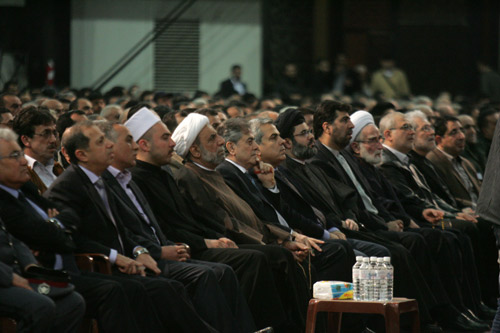
So the prophet said all humans were equal: males and females, masters and slaves, the black and white, other different races, Arabs and non-Arabs, etc...
How do think such a community perceived this kind of speech, especially when people looked down on slaves and serfs? Messenger Muhammad prophesied the religion [of Islam] and made humanist approaches; that was contrary to all prevailing traditions, conventions, and habits of the different cultures at that time.
It is true the prophet said that all were equal humans, but he said that what distinguished anyone were the good deeds, charity, and righteous acts he/she did, as well as the infamy, sins, and wrongdoing he/she avoided. So it was not a matter of gender, color, tribe, race, or origins.
"The best is he/she who does best to his/her kin. Allah loves most among the people He created he/she who benefits his/her kin." It was a new norm the prophet launched. And he emphasized that orphans, the poor, the needy, the homeless, the distressed, and the agonized be treated with utmost humanism.
It was not enough to fund them or provide them with shelter. It was not a matter of helping them to make a worldly gain- like getting their votes, for example, nor was it a matter of seeking recompense in the hereafter or a place or degree in Heaven. To the prophet, this level did not seem enough.
He asked people to demonstrate sympathy, love, brotherhood, respect, and appreciation. Modestly, the prophet (PbuhahH) sat side by side with the poor, fed them by himself, talked to them, and shared their concerns. After all, this was part of his humanist approaches.
Well, some really wealthy people might make great funds to the poor and needy, but they won't even want the poor to say hi to them, and they won't ever feel that it's "convenient" to sit side by side with the poor. So it's actually a completely different story.
Now the prophet (PbuhahH) set a further goal: He strived to change the selfishness in people to humanism. He did not want people to be limited by their personal interests or those of their clans or tribes. But rather he taught them to care for the entire humanity: to care for people's concerns, feel their pains, think about saving them, and assist them. Surely enough that was an outstanding humanist conduct.
Sorrowfully enough, nowadays filthy campaigners are working hard to offend the Greatest Messenger, his humanism, and the authenticity of the religion and message he prophesied. Certainly, it is one of the most serious challenges for the Ummah and all of its scholars.
First, let me speak about things in general. Some offensive films, caricatures, books, and articles have been made, which can by no means be discussed logically. It's true we don't mind any reasonable discussion regarding our creed, cognition, religion, and prophet, and there's no problem at all, for our Holy Qur'an calls for flexible dialogue and wise and lenient preaching. But no cult can ever accept that their sanctities be offended or addressed derogatorily.
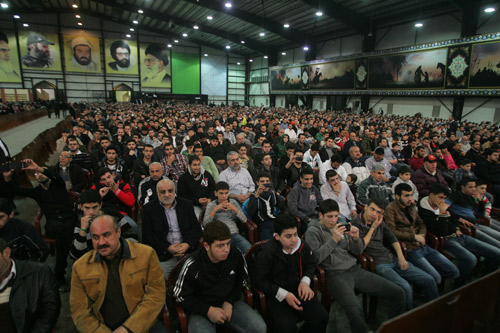
We do have to express our outrage and convict this act, but we must also say as we celebrate this great prophet's birth that it is our duty as well to do something positive; we must introduce this prophet (PbuhahH) to the world. We must let them know his life story, special character traits, perfections, religion, message, and sayings. Some groups are trying to defame Allah's Messenger Muhammad (PbuhahH), which is absolutely unfair. So we must make the truth clear.
We need to answer any questions on this issue. We as well need to introduce this great, historic, and outstanding person.
Recalling [a verse part of the Holy Qur'an:] {...you may hate something when in fact it is best for you,} I note that for decades- perhaps for centuries, probably each group of all Islamic movements, Muslim scholars, and followers of different Muslim doctrines has been trying to introduce the imams, jurisdictional scholars, and people of its doctrine.
Well, since we all agree we have the same prophet, why don't we make an effort to do so?
However now it is quite challenging that all Muslims of different doctrines prioritize introducing the prophet they all believe in and admire. They must introduce the prophet bringing them together to the world. Therefore, scholarly, proclamatory, cultural, rational, media, and research efforts, as well as any other possible efforts, must be made.
And no lagging behind is allowed because those group are still taking their part in this battle. Offending Allah's Messenger (PbuhahH) is not at all an unplanned or an amateurish act, but rather it was planned by groups with certain motives: They are trying to incite strife among Muslims and Christians and among Muslims themselves.
They're trying to make Muslims react inconveniently out of rage... All in all, many motives are behind what is going on, and this must be confronted.
Moving to the current regional issues, we realize that more forms of sectarian conflicts, struggles, clashes, and separations exist in many of the countries of the Arab- Islamic World. This reality exists among Muslims and Christians in some countries of the Islamic World like Nigeria, for example, and among Shia and Sunnis.
Let's consider things in a more realistic manner, and let's not exaggerate them. It's not just sectarianism creating the ongoing struggles. For instance, some Arab countries' populations are totally Muslims with no Christians, or totally Sunnis with no Shia, or even Sunnis of the same doctrine. But turbulences and troubles are still occurring. In the Arab and Islamic countries as a whole, there are national and Islamic currents, Sufis and Salafis, northerners and southerners, easterners and westerners, tribes, different social classes, and various cults. Therefore, it is wrong to say the current regional chaos, turbulences, or challenges are only sectarian. It is essential that we realize there is much more than just sectarianism.
Making an approach to this fact, we realize Lebanon is a part of this region, so we have our problems, too. Our country is part of the Arab-Islamic World, and whether we like it or not, it gets affected by their incidents, as well as the international incidents. Perhaps Lebanon is the country most vulnerable to the events happening in the neighboring regions. Having made this approach, I'd like to mention some points:
First, none must be scared of the unrest, conflicts, and struggles, and none can scare us. At the end of the day, this situation has forever existed: in the history of Muslims, Christians, other religions, and races. This has existed ever since the birth of Prophet Adam (Pbuh). Just before then, the angels asked the Lord, "Are you creating who will corrupt and slaughter on Earth?" So has the human history been. As long as humans are humans with insatiability, lusts, and bigotry, what's gone on does not sound strange!
Hereupon, the worst thing to do is not to figure out how to deal with these crises. We need to make sure we don't lose awareness, self-discipline, decisiveness, prioritizing issues, and making the initiative. In contrast, if all of us demonstrate awareness and responsibility, if we do not allow the events to shock or scare us, and if we decide to deal with these crises wisely and responsibly, we can overcome or reduce many consequences that might happen.
Second, let's make another approach. Even in the countries where various religions or sects exist, struggle isn't always of sectarian nature.
Let's consider some historic examples. Political reasons stirred up the majority of the struggles, conflicts, wars, separations, attacks, and slaughter... It was not a matter of conflict regarding cognitive, creedal, religious, and jurisprudential issues. So it was a matter of seizing authority over peoples, and it had nothing to do with religion, Shia or Sunnis, or Muslims or Christians.
I don't have enough time to cite all historic wars, so I'll cite some:
Among the greatest wars in Muslims' history was that of the Umayyads and Abbasids; it killed hundreds of thousands of people. So what did Shia, Sunnis, Islam and its prophet have to do with it?! It was a battle of seizing authority over the entire nation.
Then came the long-year war of the Abbasid al-Amin and al-Ma'moun, which killed tens of thousands of people. So what did the Shia have to do with it?! Well, some might try to exploit this case, so let me say Shia and Sunnis had nothing to do with it.
Furthermore, other conflicting groups destroyed their nation because of their war for power, as in the "Battle of Daahes and al-Ghabraa". Likewise, for hundreds of years, the princes and ministers of the Abbasid government kept killing each other and beginning war against other peoples and invading their cities. So what Sunnis and Shia have to do with the war of princes and ministers?! In those hundreds of years, it could have been claimed that it was a battle of religion, sects, or doctrines, but that was never the truth of the battle going on.
Well, let's move to a closer history- 500 years ago. Back then, the Ottomans' war on the Mamaliks began. So what did that have to do with Sunnis, Shia, religion, or Islam?! Nothing at all! After the Mamaliks had achieved a great national victory, the Ottomans "crushed" them. So it was not a matter of sectarian struggle.
In brief, only some struggles were sectarian, not the majority.
Let me give another example, the "Iraq-Kuwait War" [approximately two] decades ago was one of the most terrible regional wars. It even introduced a totally new security stage that brought US fleets to the region. So was it because of religion?! Was it a Sunni-Shia war?! What did we have to do with it?! What did Shia and Sunnis have to do with it?! It was a war for power, oil, and land. Like I said, sometimes certain groups try to exploit such situations. For example, the "Ottoman-Mamalik War" was said to be a war for power, but the "Ottoman-Safavid War" was said to be a "Sunni-Shia war". No, pal, it was not a "Sunnis-Shia war"! It was war for power. By the way, as I'm not addressing a historic event but mentioning an example, I'm trying to convict neither the Ottomans nor the Safavids.
Likewise, the "Ayyubid-Mamalik War" was said to be a war for power, but the "Ayyubid-Fatimid War" was said to be a war of sects. But in fact, it was war for power.
You see, I am not discussing historical facts, but I need to confirm that many past wars and current struggles and conflicts originated from political motives, not from issues of doctrine, religion, Islam, Christianity, Sunnis, or Shiites. If we consider the eight-year-long Saddam Hussein war on the Islamic Republic of Iran, we'll have to "thank" him he didn't claim it was a struggle of sects! Anyway, he couldn't have done that because in fact a big part of the Iraqi military officers and soldiers fighting in Iran was Shiite. So how could he have claimed it was a battle of sects?! That's why he claimed it was an Arab-Persian battle.
Yet very unfortunately, some current Arab regimes don't even care about the Sunni sect, any Sunnis, or Palestinians! Statistics held in the Arab World, the majority of which is Sunni, show there are tens of millions of starving people, tens of millions of illiterate ones, tens of millions of unemployed ones, and so on...
Though the regimes have piled up hundreds of milliards of dollars, they're doing nothing to the Sunnis; whereas when it came to intervention with a conflict with Iran, it was claimed it is a "Sunni-Shia" struggle. No, it was not! Even in time of the "Iran-Iraq War", Iran did not see it was a "Sunni-Shia" struggle. Instead, it was the battle of Saddam Hussein and the regimes that provided him with hundreds of milliards of dollars for that bloody war!
Having made this interpretation, let us think what we are meant to do.
We're meant to restrict any conflict or struggle in Lebanon and abroad- Syria, Iraq, Bahrain, Yemen, Egypt, Tunisia, or Libya. Muslims, Christians, Shia, Sunnis, different currents, national ones, and Islamic ones must realize that struggles might begin for political reasons rather than sectarian ones; therefore, all must avoid sectarian rhetoric and inciting bigotry among people. In many cases, certain groups can let the genie out of the bottle, but they can never get it back! Their sectarian rhetoric might create a snake, which they later become unable to control, so it kills them themselves. We need to be vigilant now that any malevolent rhetoric might ruin everything.
So we need to restrict problems in whatever country in the Arab-Islamic World they occur. We must not generalize and link issues together irrationally lest things become harder to tackle.
Brothers and sisters, our Arab-Islamic World, Christians and Muslims, Sunnis and Shia, nationalists and Islamists, we must be tolerant. Unfortunately, children of the same revolutions in several Arab countries are now "wrestling with" each other.
Where do you think this leads us? The only solution is to maintain clemency, leniency, and dialogue rather than begin rushed conflicts. Even the already conflicting groups must resort to dialogue and look for settlements, treatments, or solutions. This is what we're calling for again today. We call on all, whether in Syria, Bahrain, Yemen, Tunisia, Libya, Iraq, or Lebanon, to make sure they avoid conflict amid the current developments.
Eventually, all have something to say. All have certain logics and rights. We must listen to each other and try to tackle our issues rationally even if it's going to take a little longer. We can't conflict and ruin our countries, communities, and people while the West and "Israel" watch us and affront us. As in many cases, the West and "Israel" even let go of their marionettes that have made some booties in battles they've begun for their sake.
I recall when His Eminence Imam Moussa as-Sadr (May Allah bring him back safely) held two huge festivals in Baalbeck and Sur (Tyr) in the 1970s. Back then, he addressed the rights of the deprived. But as the "Lebanon Civil War" broke on, he stopped everything and said the state was "withering" and the country was getting destroyed. His Eminence said, "We want a secure country where we can live and a real state so we can demand that our rights be given. None can destroy a country for any rights or reformations."
So there must be a secure country and a real state so that rights can be demanded and reformations can be made. And this can only be achieved when dialogue and settlement exist. And let us replace all forms of conflict and fight into peaceful debate.
Today, the elite of our Arab-Islamic World- scholars, politicians, writers, thinkers, founders, and media- have a great responsibility to fulfill as people are actually influenced by them. Thus, now it is their responsibility more than any other time before to guide people to the best of the worldly life and the hereafter.
Let me address the "Israeli" elections. By the way, although many people are not even concerned with what is going on in the "Israeli" entity, we consider we are concerned with keeping up with that no matter what current or regional developments occur. In the first place, the problem began there as the Zionist entity was established. That entity has provoked many past and current catastrophes for the sake of its survival.
I do not wish to analyze the election but to make a conclusion on the "Israeli" elections:
The entity's pioneering parties, like the "Labor Party" and the "Likud Party", are clearly performing weaker now. Besides, no "strong, leading party"- like Netanyahu wanted- came to light through the "Israeli" elections.
Major leaders are as well absent. You remember that once I reported what someone had told me, "Never be scared of [Ariel] Sharon. He's the last of the "Israeli kings", and he can do nothing." Back then, Sharon was addressing threats to the entire Arab-Muslim World and "scaring" them. So in one of my speeches, I mentioned Sharon was the last of the "Israeli kings", and this has become evident. Can anyone tell me who the "king" is now?!
Well, at the end of the day, they had to assign Netanyahu to premiership since they had no alternative. To them, Netanyahu was the best they could find. However, they clearly have a problem with trusting Netanyahu.
Therefore, the absence of major leaders, the firmness of the extreme religious parties after their progress, and the increase in the number of parliamentary parties and blocs does complicate administration and political decision-making. On the whole, the way the elections developed clearly tell the "Israeli" entity is suffering crises of administration, parties, and trust. So it's an entitative crisis.
However, what we should've never been deceived with and should never be deceived with the issue of the rightist, extreme rightist, leftist, extreme leftist, and moderate parties or whatever.
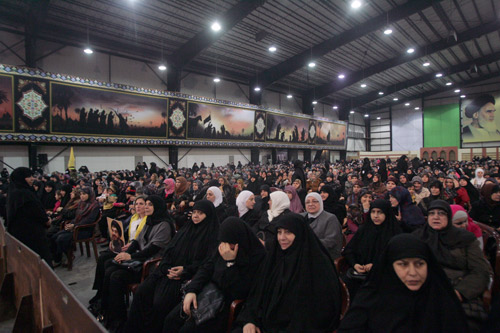
When it comes to al-Quds (Jerusalem) and the Palestinian people, rights, cause, and refugees; also when it comes to the Arab causes and rights, whether in the Golan, Lebanon, Sinai, and Egypt, it's the same "Israeli" greediness. Whether the parties are made of rightists, extreme rightists, leftists, extreme leftists, moderates, or whoever, they all threaten the regional governments and peoples.
Experience tells most of the "Israeli" wars were declared in time of leftist "Israeli" governments. Nevertheless, none must be deceived; they're all the same. Any national-unity government or whatever party is there, it makes no difference. Yes, it's true this might result in difficulties in political decision-making and in performance. But when it comes to the "Israeli" scheme, vision, animosity, greediness, and threats, nothing changes. So we must not believe this might result in any good for us.
What guarantees Gaza's rights is the power of the Gazan resistance, what guarantees the Palestinians' rights is national reconciliation and the Palestinians' solidarity and insistence on resistance.
What guarantees the rights of the Lebanese, whoever the "Israeli" governor is- [Benjamin] Netanyahu, [Ariel] Sharon, Shimon Perez, [Ehud] Barak, or whoever, is the unity of the Lebanese Army, people, and Resistance, which we've always cited. Our national power, including all elements, protects Lebanon. It doesn't matter whether they're rightists, leftists, or moderates. The question is: Is the country able to maintain deterrence balance? Only deterrence balance can protect the country. In that case, we can drill for oil and gas and protect our country and its borders. But nothing else is useful to keep the "Israeli" enemy away. The experience existing for tens of years proves so.
The same applies to the region. That's why I say, "The best way to react to the "Israeli" elections- whatever analyses and conclusions may be- is to call for more insistence on resistance. We must all cooperate to strengthen the Gazans and all other Palestinian people and refugees.
We, the Lebanese, must cooperate to keep the Resistance strong enough and add to its strength. And we need to cooperate, too, "to detonate the mines in the Arab surroundings". This is how we can react to the "Israeli" elections.
Moving to another point regarding the Lebanese developments, we realize the mainstream issue is the parliamentary elections and the electoral law.
I need to address this issue because Hizbullah is still not holding any press conferences. Thus, we're not much into discussions or quarrels, and we still insist on this. Very unfortunately, a great part of the media and the political teams is not abiding by objective, rational argument but rather derogatory rhetoric. This is why we have chosen to stay away from such undesired squabbling.
To the Lebanese, the electoral-law issue is critical, yet is now more critical than ever. The truth is all Lebanese political forces and sects are considering this matter more critically than any time ever after the hard times and the severe conflicts Lebanon experienced, as well as the regional developments.
If we compare Christians to Muslims, for instance, we'll certainly find the Christians have bigger fears because of the Lebanese and regional developments. And we can't say they're exaggerating because once they see what is happening to Christians in Iraq, Syria, Nigeria, and other places, they build fears. By the way, I am not trying to hold anyone responsible for this, but I'm describing what the situation is like.
So, the regional developments have complicated the dialogue of the Lebanese and their assessment of the electoral law. How they actually see it is this: It's not a regular electoral law that'll result in a regular parliament but rather something very crucial. To some, the ongoing squabble means Lebanon is being divided again, but this time it's happening through an electoral law, as if we were reinitiating what we've been trying to avoid. When I once suggested a founding national conference, many went outrageous, but I confirm to you that many Lebanese are now trying to lay foundations through their discussion of the electoral law. Well, that's their very right.
Thereupon, in regard to this critical time and the regional and international developments, we- the Lebanese- need to show more broadmindedness and make more discussions so that we make them forget about their fears, even when the fears of some of them are many.
This is why it is most important that none accuses any because this is useless; sometimes accusations can be nasty. For example, I heard different Christian and non-Christian political leaders and MPs referring the proposal of the "Orthodox-Meeting" to Hizbullah, [Syrian President] Bashar al-Assad, or His Excellency MP Eely al-Firzly. After all, MP el-Firzly was one of the "Orthodox-Meeting" MPs.
What I want to say is such very critical laws, which will determine the destiny of our country for four years or more, must not be approached with so much malice.
They said it was Hizbullah that "plotted" the "Orthodox-Meeting" proposal and "dictated" it to their Christian allies, including General [Michel] Aoun, MP [Sleiman] Franjieh, and the "Tashnak Party"! They said that Hizbullah "imposed" this proposal on their allies in some kind of way, so Christians began "outwitting" the situation, and Bkirki, the "Lebanese Forces", the "Lebanese Phalanges", and everybody else "went chaotic"!
What kind of talk is this?! It offends all Lebanese Christians, including Bkirki's figures and all other ones, whether we agree with them or disagree. They've been making more statements and writing more articles on this issue, showing no sense of responsibility at all in approaching it. They're propagating lies and exaggerations!
[Sayyed Nasrallah makes an ironic question]: If they really think we're so capable of holding this strong grip on our Christian allies and making them act like we want, why don't they just let us manage the country's affairs?!What kind of exaggeration is this?! And the claim offending the Christians makes things even worse!
But things are not really like what they seem. When the "Orthodox-meeting" proposal was first made during debate, we refused it, or at least had our own reservations. But when our allies explained their fears to us, we agreed. Therefore, none must make any improper claims on this issue.
I'd also like to comment on what they said about us having "intentions". Isn't it typical for any political party to seek an electoral law which maintains their representation- "in case they are fairly represented"- or represents them fairly if they're not?! Yes, it's right. They believe it's their right. Even if some try to reach an electoral law which offers them more than their normal share in power, it's still their right; at the end of the day, this is a political process. So it's not a matter of intentions. [Sayyed makes another ironic question]: Why don't they come tell us how law works?!
And they even said more about "intentions", claiming that the "Amal Movement", General Aoun, and MP Franjieh maintained the "Orthodox Meeting" because they wanted to obstruct the elections! Well, this is absolute nonsense!
They can't say there are "intentions". To Hizbullah, several choices are available. Yet, we're making an objective and rational approach to the electoral law. What we basically care about in any electoral law is proportionality, and we sure have a reason.
Some might say proportionality currently grants us the majority of the votes. But I tell them that proportionality might as well not grant us the majority of the votes in the future. After all, you know this is a country of changing alliances; people might conflict with each other. Moods might change as regional developments take place. So proportionality might eventually lead us to the minority of the votes.
But in fact, it's not about what this law offers us; it is about fairly representing all Lebanese political currents, whether each symbolizes certain sects or a group of different sects. And the only way for these political currents to gain parliamentary representation is to reach a proportionality-based electoral law. Disregarding what proportionality will allow us, we believe this is the right thing to do.
Now we agree on considering Lebanon one electoral constituency where proportionality rules. We have no problem with this, so if they agree, we'll move on. We as well agree on dividing Lebanon into districts where proportionality rules or into expanded constituencies. We also approve of the proposal the government made to the parliament: dividing Lebanon into 13 constituencies where proportionality governs. And we approve of the "Orthodox-Meeting" proposal.
What all of these proposals have in common is proportionality, and this is why we approve of them.
Why do we adopt proportionality? Well, we believe it allows everyone parliamentary representation. This means all political powers with the least popularity can get parliamentary representation. As Hizbullah debated proportionality, I have come to this conclusion- though I might have missed some information: The "March 14 Alliance's" main controversy concerning proportionality- probably the only one- is the issue of "Hizbullah's arms"! So they're calling for "no proportionality accompanied by arms". Their claims are false, however.
Let's make some kind of logic here:
Our Resistance has existed even before 1992. In 1992, 1996, 2000, 2005, and 2009, we took part in the elections, so can anyone tell we used our arms in any of the electoral constituencies to impose our political convictions?! Can anyone?! This is very clear proof, I believe.
Also as to their claims that we're using our arms in the elections, I say that today everyone has arms. Could we possibly ever launch a "Zilzal" [Literally: "Earthquake"] rocket, a "Fajr 5" [Literally": "Dawn 5"], or an "Ayoub" drone just to impose our political conviction on any of the villages?! [Sayyed Nasrallah makes a joke]: Well, it just takes a Kalashnikov assault rifle to bring about terror and fear and impose one's political conviction on anyone. The great majority of the Lebanese in all Lebanese regions has Kalashnikovs.
Furthermore, supposing we were using our arms to influence the elections, why wouldn't we try to influence the electoral law depending on majority instead of proportionality?! After all, it's enough for us to "influence others" to get 51% when law is based on majority. Proportionality, however, will allow the other team to gain a percentage above threshold, and this might qualify someone to the parliament. Supposing we were using our arms to influence the elections, we could have used them to impose the electoral law depending on majority instead of proportionality, but we never did.
Hence, I believe the claim made is untrue, not to say more.
But this is not the problem at all. Neither we nor the others are using arms to influence the elections though arms are there in Lebanon.
But a more dangerous weapon is being used: money. A senior official supporting the other team [the "March 14 Alliance"] told me something, and one day I might tell you who he is. Anyway, he said, "In 2009, we paid $3 milliard for the parliamentary elections." Can you imagine they paid this amount of money in our small-area Lebanon! Back then, I joked, "Had we known you were going to pay $3 milliard, we would have asked you to give them to us in return for enabling you to hold a grip on the elections!"
So which is more dangerous: arms or money?! Very unfortunately, many media are reporting untrue and unfair news and fake stories to stir up conflict. So which is more dangerous: arms or media?! Which one influences elections more?!
We'd like to give an ear to objective, rational debate whereby fears of the size of parliamentary representation may be expressed. In fact, the problem with team refusing the electoral law depending on proportionality is that it fairly represents the political parties. Yes, proportionality does so.
Certain teams believe it is a guarantee to seek a bigger size of representation than they actually deserve. I understand their fears, but we must approach things in a way that considers everybody's fears.
I'll make a final comment on the "Orthodox-Meeting" electoral law. Today, Christians have their fears. Some are trying to exploit the situation, raising questions whether Hizbullah and the "Amal Movement" are going to vote. Well, we told the others that we've agreed, so it means we'll vote once we're called to do. This is our stance, and the "Amal Movement's", too.
Some of our really respected allies have their own reservations on the "Orthodox-Meeting" law. Yet, if the parliamentarians are to meet tomorrow morning and if a general committee is to collect votes for [acknowledged] electoral laws, we're going to vote for any of the present laws: the government's, the "Orthodox-Meeting's", or the law whereby Lebanon is considered as one electoral constituency. I think I'm being clear enough, and none can tell Hizbullah and the "Amal Movement" are "exploiting the elections, making plots, or trying to make Christians fight"! Nope, we're honest and we know well what we're doing.
Today, the great majority of Christians believes that the "Orthodox-Meeting" proposal will allow them fair representation and participation in the government. There is no common definition for "true participation" among all Lebanese teams, though.
That's why we- Lebanese Muslims of all sects- allow the Christians this chance and move on to parliamentary elections where no political teams think they unfair representation. As for the ones having had more representation than their real size was and not maintaining the same representation for now, they can take it easy at this particular stage. We need a parliament where participants believe they are fairly represented and have no fears.
The next parliament may be a great chance for people to reform and develop the regime. In that case, they won't even need different conventions and alliances to meet or debate. Fairly represented in the parliament, they will be able to talk to each other, make laws, and approve of governmental policies, etc. So why don't they make use of this chance?
Hizbullah has constantly allowed debate. And just like Christians have their fears, Muslims do. Thus, we believe we need to understand so and eventually get somewhere.
I call the Lebanese to debate a fair electoral law. I tell the teams that have been expecting the fall of Damascus and a dramatic change in Syria: "Kindly forget about it" because you can't exploit it to overpower the other Lebanese!
This is the call I make to them. Clearly, all local, regional, and international political developments tell that things have gone as unexpectedly as many have wished...
I'm not going to address the Syrian developments; our stance is very clear. But I say to the others: Forget about the Syrian developments. We don't want to exploit them to overpower anyone, and you as well must not do that. So forget about it and let's talk about our country, people, problems, and sects. Let's make use of our multinational political forces to debate our fears and ambitions and eventually get somewhere.
I hope that all consider the electoral law as seriously as they should. Even if some haven't said it, the way they're acting shows they believe it is essential for a long period to come.
Being busy with the electoral law doesn't mean the government can forget about the Lebanese people's current issues. The government must allow serious, responsible, and fruitful dialogue with the "Syndicates Coordination Committee". The government also needs to tackle the issues of Syrian and non- Syrian migrants, security, and the issue of prisons and the arrestees so far not trialed...
Regarding the issue of the Islamist arrestees, I say: It is unimportant what conviction people have; the point is some have been arrested for 4 or 5 years without trial. Now that the government has recently prepared a court hall, why doesn't it put these Islamists on trial?! Why keep imprisoning them for more years without trial?!
This is unjust, whatever my or others' convictions are.
At the end of the day, we must support right and justice whatever the cause is. So we're not exactly asking the government to release these Islamists; we're asking it to put them on trial instead of keeping them and other Lebanese arrestees in the Lebanese prisons for years. The Lebanese judiciary holds prime responsibility for this, and the government must encourage the judiciary to move rather than claiming it can't intervene with the judiciary's work.
It is not right for the Lebanese people and government to get occupied with the electoral law and to forget about all these issues. We hope all can approach an electoral law with a sense of patriotism so that we obtain a fruitful outcome.
Again, I say: Many happy returns. May Allah the Almighty bless your time as you commemorate the blessed birthday of Allah's Greatest Messenger Muhammad (Peace be upon him and his Household).
Allah's peace, mercy, and blessings be upon you all.
Source: Hizbullah Media Relations, Translated by al-Ahed news

